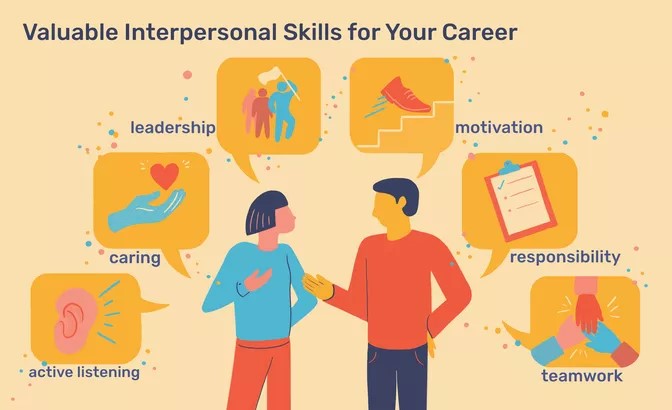28 examples of people skills

2367
Resume Maker February 22, 2022
We've put together a long list of examples of people skills, that you can include in your CV and cover letter:
1. Communication skills
Communication skills are a vital part of good people skills.
Excellent communication skills allow you to accurately convey information, select relevant facts, when listening to people, and make presentations to large groups.
Communication skills are so important that it has been named the #1 soft skill, that employees must have. Employees with effective verbal and non-verbal communication skills can explain complex ideas in simple terms and use body language, to get their point across, making them more effective in the workplace.
2. Conflict resolution
Conflict resolution involves acting as a neutral party when two or more people have a dispute.
The ability to successfully resolve problems between people is important for many different professions, especially for those in customer service, human resources and management.
In addition, conflict resolution is closely related to calmness and equanimity.
Both are essential to understanding the different sides of a dispute and to helping parties to reach a mutually beneficial compromise.
3. Negotiation skills
The ability to negotiate is an important skill for working with people - whether or not you want a pay rise, whether you want an extension on a difficult project or are negotiating a contract with a new client.
Because every client is different, you need to be able to understand their needs, while keeping your company's interests in mind.
4. Patience
Patience is a skill that will help you manage stress levels and make the interaction of workplace more smoothly.
By taking a step back, you appreciate the situation and empathize with the other person, you'll be better equipped to avoid misunderstandings in the workplace.
5. Trust
Building trust takes time and effort. But if you invest energy in building trust with people, you'll find that they become more willing to listen to your opinions and take your ideas seriously.
Consistently behaving with integrity and sincerity will help you become a trustworthy person in the eyes of your colleagues, someone they are comfortable turning to for advice.
If you are a manager, credibility is especially important. If you fail to earn people's trust, you lead, it will affect the performance of the whole team.
6. Empathy
Empathy is the ability to understand a situation from another person's perspective.
Although it is a skill that comes more naturally to some people than others, it can be practiced.
Try to recognize your own biases.
Don't just listen to what the other person is saying, but try to understand why they are saying it.
In the workplace, empathy will help you connect with your colleagues and customers.
It's a skill that will make you better equipped to handle or even avoid situations, that may arise due to miscommunication.
7. Active listening
Being a good listener involves more than just letting others talk without interrupting them.
Unlike a passive listener, a person with active listening skills gives the speaker his or her full attention.
They pay attention to the points the speaker is making and respond thoughtfully.
Active listening is an important skill in the workplace. In a work environment, you need to engage with other people's ideas, whether your boss is giving you feedback or a colleague is making suggestions for a project.
8. Responsive body language
Body language, if used effectively, is a great tool for both conveying a message, and to build trust. Some studies show that body language makes up more than 50% of communication and is more important than the actual words spoken during a conversation.
If you are aware of how your body language is interpreted by others and learn to use it to your advantage, you will become a more effective communicator.
20 additional people skills:
Self-confidence
Collaboration
Creative thinking
Customer service skills
Flexibility
Persuasion skills
Charisma
Mediation
Networking skills
Conversation skills
Social skills
Teamwork
Openness
Humor
Team building skills
Honesty
Problem solving
Patience
Courtesy
Motivational skills
BACK TO ALL BLOG ARTICLES